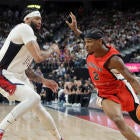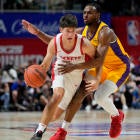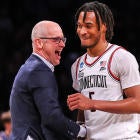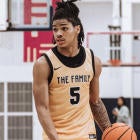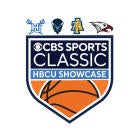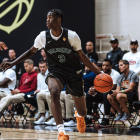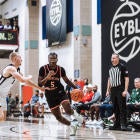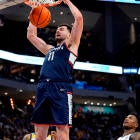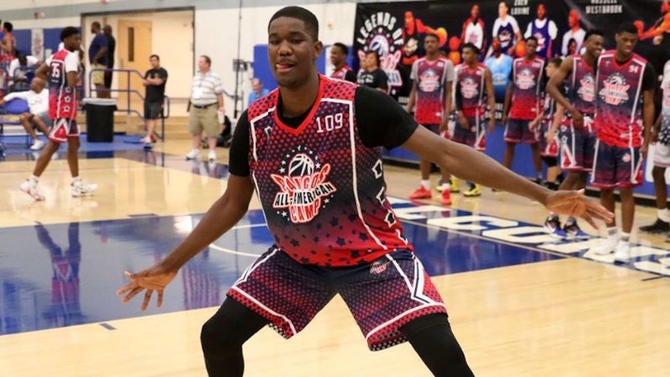
NORTH AUGUSTA, S.C. -- The consensus No. 1 player in the Class of 2017 is DeAndre Ayton. He's a 7-foot forward from the Bahamas who now lives in Arizona. And the consensus No. 1 player in the Class of 2018 is Marvin Bagley. He's a 6-10 forward from Arizona who now lives in California.
They played against each other Thursday here at Peach Jam.
I talked with both afterward.
And though Ayton insisted he intends to spend exactly one year in college, he acknowledged a questionable academic record to date has him taking multiple online courses this summer -- "Pre-Calculus and English," he said -- just to be "on track" to meet the NCAA's minimum requirements for freshman eligibility. So who knows? And though Bagley is still roughly two years from having to make any final decision about anything, he acknowledged that skipping college completely is at least under consideration. So, again, who knows?
"I'm just trying to do what's best for my family," Bagley answered when I asked, inside the Riverview Park Activities Center, if not attending college is an option for him. "Whatever we decide to do, it's really not up to me. It's up to God."
So that sound you hear is Sean Miller (Arizona), Bobby Hurley (Arizona State), Mike Krzyzewski (Duke), John Calipari (Kentucky), Dana Altman (Oregon) and Steve Alford (UCLA) -- i.e., the coaches of the schools Bagley is considering -- trying to get right with God. But, in all seriousness, the Ayton and Bagley storylines are ones that will be around for at least another year. And they're storylines worth following because, since the one-and-done rule was implemented, college basketball has never been at this much risk of missing out on back-to-back consensus No. 1 prospects.
"Absolutely," answered a source familiar with Ayton and Bagley's backgrounds when I asked if it's reasonable to suggest both could face eligibility concerns. Which means Ayton might be forced away from college even if he sincerely wants to attend. And Bagley? Well, like I wrote, he's already acknowledged college isn't definitely in his plans, eligibility concerns or not.
"I really can't sit here and say I want to skip college or that I want to go to college," Bagley told me. "Whatever happens, happens."
To be clear, these two prospects will almost certainly end up fine no matter what because they're both so naturally gifted and physically overwhelming, and because there's evidence -- from Brandon Jennings to Emanuel Mudiay to Thon Maker -- to suggest skipping college, for whatever reason, doesn't negatively affect the draft stock of elite prospects. In fact, there are reasons to believe skipping college might actually help elite prospects' draft stock -- Maker going 10th to the Bucks in last month's NBA Draft, after spending a year in prep school, being the most obvious.
And to be clear, I'm fine with both Ayton and Bagley skipping college, if they want, because I've never believed elite prospects necessarily need college. Can they benefit from it? Sure. We all can. But Kevin Garnett didn't need college. And LeBron James didn't need college. And Kobe Bryant didn't need college. And Dwight Howard didn't need college. And Amar'e Stoudemire didn't need college. And I don't really think Karl-Anthony Towns or Ben Simmons, the past two No. 1 overall picks in the NBA Draft, needed college either even though they both spent a year in school.
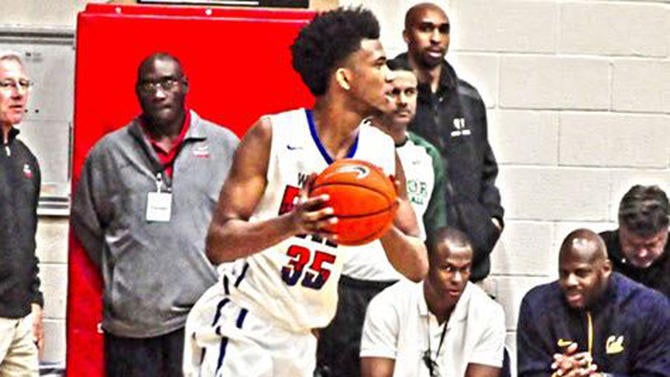
Bottom line, I've forever subscribed to the notion that most great basketball talents reaching or not reaching their potential has little to do with the path they take to the NBA. I think Towns would be Towns no matter if he went to Kentucky or Western Kentucky. I think Simmons would be Simmons no matter if he went to LSU or Louisiana Tech. And I think Ayton and Bagley will be Ayton and Bagley -- whatever that ultimately proves to mean -- no matter if they go to college or Europe or Australia or prep school for a year after graduation.
They're both that gifted.
They reminded a packed gym of as much Thursday.
But do you want to know what bothers me? What bothers me is that these young men -- both of whom come across as intelligent and thoughtful -- might have their options limited because of the decisions made by the adults guiding them, and that's too bad. But here we are thanks to Ayton and Bagley each bouncing from one school to another and enrolling in a questionable -- some might say "sketchy" -- institution.
(Try to follow me here ...)
Ayton transferred, before his junior year, from Balboa City High in California to Hillcrest Prep in Arizona, where he was expected to team with Bagley, who had already transferred from Corona Del Sol High in Arizona to Hillcrest Prep. But that plan only lasted a few months because Bagley subsequently transferred from Hillcrest Prep to Sierra Canyon High in California, where he spent last semester but was ineligible to play. In other words, Bagley attended three different high schools before even completing his sophomore year, and there are questions about what he did during the time between leaving Hillcrest Prep and enrolling at Sierra Canyon. And Ayton is still at Hillcrest Prep even though he said Thursday that his academic work is now being done via Arizona Connections Academy, which, according to its website, is a "tuition-free online public school."
One thing worth noting is that coursework from Arizona Connections Academy does meet NCAA nontraditional core-course legislation under certain circumstances. So that's good. But coursework from Starshine Academy -- where most Hillcrest Prep players reportedly actually take classes -- does not meet NCAA non-traditional core-course legislation. So that's bad. And yet the adults in charge of the No. 1 prospects in 2017 and 2018 still sent Ayton and Bagley to play for Hillcrest Prep.
Here's my question: why?
Why would adults jeopardize the college eligibility of elite prospects over something so avoidable? And don't tell me this stuff isn't avoidable. Because all any parent or guardian has to do is visit the NCAA Eligibility Center's website -- here's a direct link -- and they can easily and quickly search any high school or prep school in the world to see if it's certified by the NCAA. It literally only takes seconds. And yet year after year -- the latest is former Arizona pledge Terrance Ferguson -- elite prospects find themselves facing academic questions because the adults in charge of them enrolled them in questionable institutions.
That's what bothers me.
So here's hoping DeAndre Ayton and Marvin Bagley can overcome their guardians' irresponsible decisions to date, and, in theory, there's still time. But it's ridiculous that Ayton is currently having to take multiple online summer courses (while traveling the country playing basketball) just to, as he put it, get "on track" to meet freshman eligibility standards. And it's embarrassing that Bagley has already attended three high schools, the result of which has cost him at least one season of basketball.
Again, in the end, they'll both likely be fine.
With or without college, they'll end up in the NBA.
With or without college, they'll both be multimillionaires.
But young and seemingly smart people with this much talent and so many awesome opportunities at their fingertips should never be in a position of academic uncertainty simply because the adults in charge made decisions that are nonsensical to sensible people. Because even though I don't believe every elite player necessarily needs college, I do think every elite player should have the option of college. And it's shameful when shortsighted adults jeopardize that option or, in some cases, take it completely off of the table.









